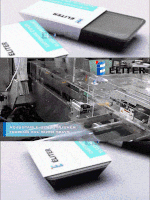Ainia announces advances in the chemical recycling of biodegradable waste as an alternative to composting
2024-07-01
The packaging industry is facing the need to reduce its dependence on fossil raw materials, replacing them with recycled or bio-based materials derived from renewable and natural raw materials, mainly of plant origin. According to data from European Bioplastics , bioplastics account for approximately 0.5 percent of the more than 400 million tonnes of plastic produced annually. Global production capacity for these products is expected to increase significantly, from around 2.18 million tonnes in 2023 to approximately 7.43 million tonnes in 2028.
Bioplastics represent an opportunity to increase circularity and sustainability in the industry because they offer similar alternatives to conventional plastics obtained from fossil sources (PE, PET, PVC…) and their corresponding applications.
The impact they generate on the environment is much lower because they come from renewable sources, such as biomass or specific crops, which reduces dependence on non-renewable resources and reduces greenhouse gas emissions throughout their life cycle. life. However, the viability of large-scale production of biopolymers involves overcoming technological challenges such as production capacity, yields, costs or the selection of raw materials.

Recovery of biodegradable waste
Within the framework of the Revaloriza II project , Ainia has investigated chemical recycling for the valorisation of biodegradable plastic containers, as an alternative to industrial composting, where a large part of the biopolymer value chain is lost. Specifically, work has been done with different bioplastics available on the market, and specific processes have been developed to decontaminate these containers before recycling, allowing for effective treatment and improving the viability of recycling in real situations. Likewise, the technical-economic viability for the industrial scaling of the chemical recycling process (solvolysis) has been studied and new recycled biobased polymers have been obtained from the resulting products.
These biopolymers not only present advanced properties for new plastics, but also open doors to innovative applications such as biodegradable microcapsules, green solvents and antimicrobial coatings for paper and cardboard.
This project is an important step towards the transition to a circular economy and meeting zero emissions targets for 2050, especially in the packaging industry in Europe.
A viable and sustainable opportunity
Bioplastics are integrated into sustainable and circular practices to address challenges such as the transition to a green economy, food security and health. The use of sustainable chemistry in their production represents an innovative opportunity to facilitate economies of scale, supporting biotechnological processes such as fermentation and biocatalysis.
This strategy not only responds to current demands for responsible consumption and energy efficiency, but also opens up new possibilities for research and innovation in the industry, thus contributing to long-term sustainable development.
This project is supported by the Valencian Regional Ministry of Innovation, Industry, Trade and Tourism, through IVACE , and is funded by the European Union through the Valencian Community Feder Programme 2021-2027.
Ainia is a technology center established in 1987 as a private, non-profit association.




